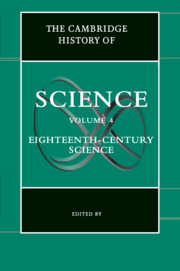Book contents
- Frontmatter
- 1 Introduction
- Part I Science and Society
- Part II Disciplines
- Part III Special Themes
- Part IV Non-Western Traditions
- Part V Ramifications and Impacts
- 32 Science and Religion
- 33 Science, Culture, and the Imagination: Enlightenment Configurations
- 34 Science, Philosophy, and the Mind
- 35 Global Pillage: Science, Commerce, and Empire
- 36 Technological and Industrial Change: A Comparative Essay
- Index
- References
33 - Science, Culture, and the Imagination: Enlightenment Configurations
from Part V - Ramifications and Impacts
Published online by Cambridge University Press: 28 March 2008
- Frontmatter
- 1 Introduction
- Part I Science and Society
- Part II Disciplines
- Part III Special Themes
- Part IV Non-Western Traditions
- Part V Ramifications and Impacts
- 32 Science and Religion
- 33 Science, Culture, and the Imagination: Enlightenment Configurations
- 34 Science, Philosophy, and the Mind
- 35 Global Pillage: Science, Commerce, and Empire
- 36 Technological and Industrial Change: A Comparative Essay
- Index
- References
Summary
The Arts and Sciences brighten’d Europe’s face, Learning did no more noble blood debase, T’was honour’s genuine stamp, and dignify’d the race.
(John Mawer, The progress of language, an essay …, London, 1726)Hence the fine arts become like the mechanical; genius is fettered by precedents; and the waving line of fancy exchanged for a perpetual round of repetitions.
(William Rutherford, A View of Antient History; including the progress of literature and fine arts, London, 1788–91)A CENTURY OF CHANGE
Alexander Pope (1688–1744), reputedly the greatest English poet of his age and a man whose satiric lash spared no target and whose panegyric pen captured entire lives in a single couplet, exalted Isaac Newton this way in the widely read Epitaph Intended for Sir Isaac Newton In Westminster Abbey:
Nature, and Nature’s Laws lay hid in Night.
God said, Let Newton be! and All was Light.
These lines were widely quoted, paraphrased, and translated into every European language within a few years of Newton’s death in 1727. Leibniz, Voltaire, and most of the philosophes knew them by memory, as did the French and the Italians. Goethe, that unparalleled Enlightenment man (enlightened in almost all the senses in which this label was used in the eighteenth century), imagined himself in Newton’s place, and Byron composed variations on the Pope couplet for poetic sport. One could fairly predict that the Newton whom Pope epitomized as a mortal man, his couplet art transformed into an immortal – a veritable god. The analogy was this: God–Newton, Newton–light.
- Type
- Chapter
- Information
- The Cambridge History of Science , pp. 762 - 799Publisher: Cambridge University PressPrint publication year: 2003
References
- 3
- Cited by

